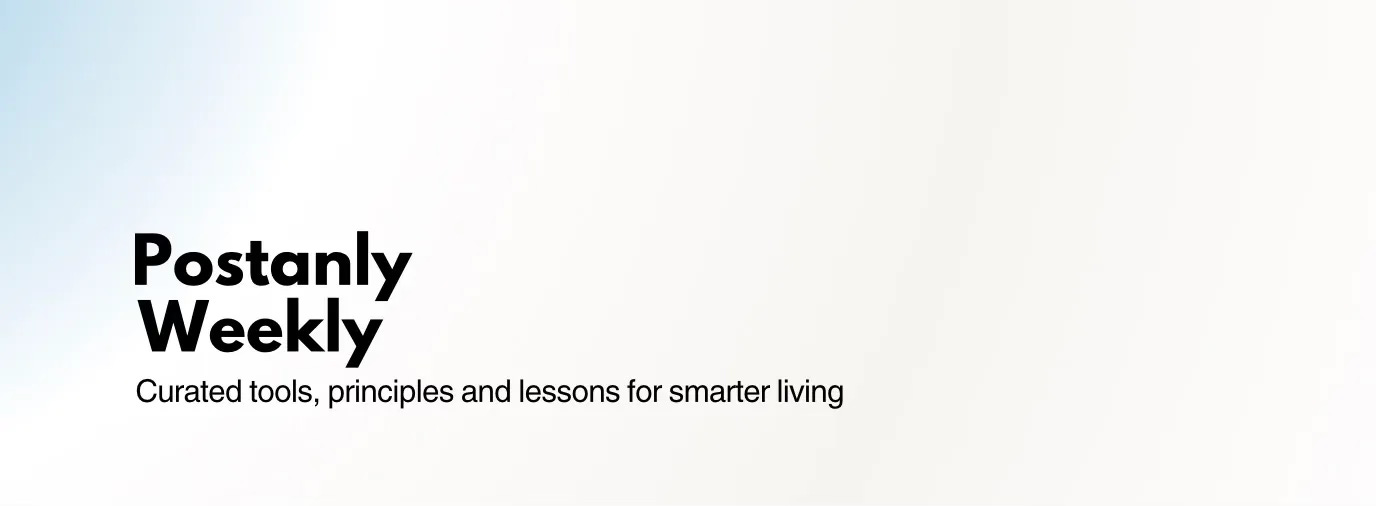The Right Way to Live, According to Spinoza
Mind-bending truths that have transformed my life
Hello everyone,
Postanly Weekly is a reader-supported smarter living newsletter. To support my work, you can upgrade to a paid subscription for $7 per month or $40 for an entire year. With a modest yearly contribution you’re not only helping keep Postanly Weekly going, you also get free access to Thinking Toolbox (mental models for life) and Mental Wealth Toolbox (practical concepts for smarter decisions).
The Wisdom of Spinoza: How to Live
The human condition is a constant search and longing: for meaning, purpose, and happiness. Life satisfaction is a natural goal. Baruch Spinoza was a famous and celebrated seventeenth-century Dutch philosopher who redefined our understanding of what it means to be ‘human’ by questioning the traditional dichotomous view of man as either rational or emotional, good or evil etc.
In his book Ethics, he argues that removing emotion from life is unnecessary to find meaning. Instead, we must focus on finding the right passion in our lives. Spinoza’s Ethics is a masterpiece on human nature, virtue and happiness. “Happiness is not the reward of virtue, but is virtue itself; nor do we delight in happiness because we restrain from our lusts; but on the contrary, because we delight in it, therefore we are able to restrain them,” he wrote.
His insights into the nature of being, freedom, and the pursuit of happiness are still remarkable 400 years after they were penned. He argued that humans can attain knowledge through reason alone through intuition and observation. Spinoza had much to say about the essentials of living well; we cannot thrive without friendship, love and compassion; striving hard and patiently working towards our goals are necessary too; and finding meaning in life is just as important as taking good care of our bodies.
Spinoza’s philosophy can be summarized by the three tenets of reason, common sense, and practicality. He stressed the importance of living a balanced life and cautioned against becoming too attached to material things. He also advocated for people to be rational and reasonable when dealing with others and avoid getting emotional or irrational in their decision-making processes.
So what’s the right way to live in the modern world?
Living well is a balancing act; prioritising the essential needs that bring out the best in you. It’s not always easy to find time for yourself, much less find ways to make that time beneficial, but it’s imperative for a good life.
The right way to live is also about your deliberate choices in all areas of your life: your career, finances and relationships. The more self-aware you are as an individual, the better you will understand where your priorities lie and what is most important to you.
Spinoza’s focus was on living a life that was in harmony with nature and led to a happy, meaningful existence. He called this way of life a ‘naturalistic’ one because it focused on understanding how humans can lead happy, fulfilling lives by following natural laws and laws of human nature.
“The more you struggle to live, the less you live. Give up the notion that you must be sure of what you are doing. Instead, surrender to what is real within you, for that alone is sure….you are above everything distressing,” he argued.
Reason over tradition
“Everyone is by absolute natural right the master of his own thoughts, and thus utter failure will attend any attempt in a commonwealth to force men to speak only as prescribed by the sovereign despite their different and opposing opinions.” — Baruch Spinoza
According to Spinoza, the right way to live is to be independent, free from prejudices and dogmas, and to follow reason over tradition. Spinoza believed that we should think for ourselves and not rely on others for our beliefs.
Spinoza’s message was simple yet profound: live according to your own values and principles. He thought everyone should be allowed to express their opinions without fear of persecution. He also believed that being tolerant and accepting of others is important. “The highest activity a human being can attain is learning for understanding, because to understand is to be free.”
Balance emotion with reason
“Emotion, which is suffering, ceases to be suffering as soon as we form a clear and precise picture of it.” — Baruch Spinoza
In Ethics, Spinoza argues that living the right way means living a healthy and balanced life. Indulge yourself in pleasures only in so far as they are necessary for the preservation of health,” he said. Spinoesian thinking gives us an important insight into how we can achieve this balance in our lives. It’s not about denying our emotions or suppressing natural impulses; instead, it’s about learning how to regulate them so that they don’t lead us down wrong paths.
Emotions aren’t inherently good or bad: they are what they are. Some people might lead emotional lives, while others don’t let their emotions rule them. Assessing your emotional tendencies helps you see where you need to improve or change so you can live the right way instead of leading an emotion-driven life.
“The more clearly you understand yourself and your emotions, the more you become a lover of what is,” says Spinoza. He thought people should be rational, realistic, and ethical. He suggested that people should not dwell on what is wrong with their lives but instead try to focus on what is right. The more I understand myself, the better I feel. Understanding my emotions helps. The clarity brings peace. I start to accept everything as it is. It's like falling in love with life, exactly as it is. No filters needed. Just pure acceptance. It's freedom.
In Spinoza’s view, humans should strive for happiness and fulfilment, but they should do so without being governed by emotion or desire. In other words, it is important to balance our emotions with reason as we strive for a meaningful life.
Getting attached to what might go wrong is a detachment from reality
Spinoza believed that the key to happiness is living in the present. He believed that our emotional and intellectual responses are often dictated by what we have experienced in the past, not by what is happening right now.
In other words, if you focus on the future, worrying about what might go wrong or how things might change for the worse, you’ll be miserable most of the time. Instead, if you live in the moment and try to enjoy every last bit of it, then you will experience joy and happiness more often than not.
For your best life focus on a few things at a time instead of being over-anxious about everything or trying to keep track of many different activities simultaneously. The less we concern ourselves with trivial details and the less we worry about things that do not matter in the long run, the happier we can be in life.
Food for thought
Mind-bending truths that have transformed my life [Free read on Medium]
The epimenides paradox. A Cretan says, “All Cretans are liars.” If he’s lying, then Cretans can be truthful. If he’s telling the truth, then all Cretans are liars, including him. Is truth even possible in such situations?
A statement that claims its own falsity creates a logical contradiction. The limitations of language and the importance of clear communication mean we rely on a shared understanding of truth and falsity to understand each other.
Your views, beliefs, and perceptions shape your reality, but sometimes, you need to see things through a different lens. Empathy and understanding flow when you see the world through another’s eyes.
A philosophical approach can help you identify what truly matters [Psyche]
“Knowing what you value and making it the focus of your life will not mean you are never sad, or disappointed, or envious of other people on social media, and it won’t cure every existential crisis. The world does not always cooperate with the pursuit of what matters – there are obstacles from other people, the environment, and sometimes from our own conflicting values. But I have found that the more I’m clear about what is important to me, the less I am inclined to worry about what others are doing and whether I’m making the right choices in my limited time on earth. The more I focus on what matters, the more energy I have to overcome challenges. Knowing what really matters to your whole self will help you orient your life around the right things – the things that fit who you are and bring you deep satisfaction.”
Shane Parrish (author Clear Thinking) on the sources of advantage in life and career
Raw talent/intelligence - Some people are just naturally better and smarter.
Hard work - Some people work harder.
Differentiation - Seeing the world differently. Doing something different. Reading different books. Interpreting the same information differently.
Process / Discipline - Creating a process and following it. Working out every day is a great example.
Talent Collector - The ability to hire the best people and get the most out of them.
Patience - A lack of patience changes the outcome.
Ability to take pain - Are you willing to look like an idiot to get better? How much risk are you willing to take, AND, importantly, can you handle the losses?
Temperament - Keeping your head when everyone else is losing theirs.
Luck
Author James Clear (Atomic Habits) on sprint downhill, not grind uphill
“Look for situations where the energy is already flowing downhill. Invest in relationships where there is already mutual respect. Create products that tap into a desire people already have. Work on projects that play to your strengths.
And then, once the potential of the situation is already working for you, add fuel to the fire. Pour yourself into the craft. Act as if you have to outwork everyone else—even though the wind is at your back.
The idea is to sprint downhill, not grind uphill.”
Thoughts to ponder from me
Common causes of bad decisions:
1. Not asking, “what are the first and second order consequences”
2. The tendency to overlook broad patterns (blind spots).
3. Making assumptions and opinions based on limited data.
4. Conforming to expectations/authority/herd mentality.
5. Believe what you desire to be the only truth, regardless of reality.
Work with Postanly. Partner with us here.
Thanks for reading!
Until next week,
Thomas
Medium | All Courses | The Write Life | Philosophy For Modern Life
Postanly Weekly is now a reader-supported publication. To support my work, you can upgrade to a paid subscription for $7 per month or $40 for an entire year. With a modest yearly contribution you’re not only helping keep Postanly Weekly going, you also get free access to Thinking Toolbox (mental models for life) and Mental Wealth Toolbox (practical concepts for smarter decisions).


